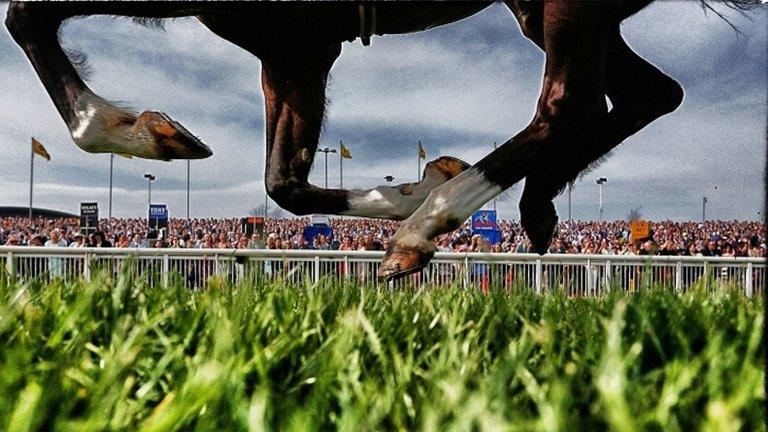Grand National 2017: Twenty years since terrorist threats delayed race
- Published
Grand National: Des Lynam reacts to bomb threat in 1997
Randox Health Grand National |
|---|
Dates: 6-8 April Venue: Aintree |
Coverage: Commentary on BBC Radio 5 live & BBC Radio 5 live sports extra, live text coverage of the Grand National on 8 April on the BBC Sport website and app (full coverage details) |
Programme producers love a 'round-figure' anniversary.
And at Aintree in 2017 we have plenty to play with: it's half a century - to the day as it happens - since Foinavon's shock success at 100-1; and 40 years have elapsed since Red Rum, the all-time greatest Grand National horse, raised the roof with his historic third win, external.
Gilded as their places in the race's long and colourful heritage undoubtedly are, the events of 20 years ago - 5-9 April 1997 - will have their own unforgettable place.
And not just in Aintree history; the dates of the weekend when IRA terrorism delayed the world's most famous horse-race by two days - recalled in BBC 5 live's 'Evacuate Aintree: 20 years on' - still resonate far further afield.
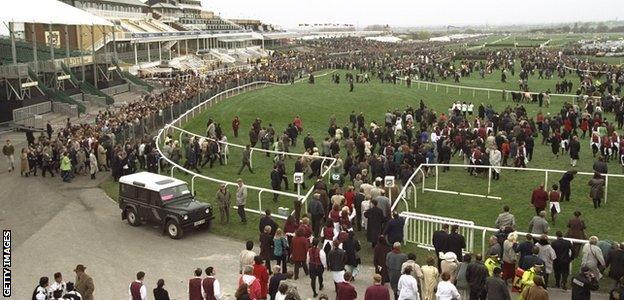
Crowds filed on to the Aintree course after the IRA bomb scare which led to the National being postponed in 1997
Two decades on, I recall that as the sun rose over the blocks of flats in the Fazakerley district of Liverpool which borders Aintree, the 150th Grand National felt to me like, for want of a better expression, a 'standard' Grand National day.
Nerves always jangle alongside excitement at Aintree, but I suspect that as four years earlier the infamous false start-drama saw the race declared void, we probably considered that we'd 'had' our major incidents for now.
That said, we were entering the closing stages of a general election campaign punctuated by republican terror threats.
Only two days earlier, three motorways had been closed by bomb alerts, but the feeling was that as the fixture was a big favourite with visitors from Ireland, we'd be OK.
Among the police, however, there was a degree of nervousness as Sir Paul Stephenson, then Assistant Chief Constable of Merseyside, and later head of the Met, told 5 live.
"We'd seen a new development using telephone calls indicating there were devices on motorways and other national infrastructure - I coined the phrase 10-pence [cost of a phone box call] terrorism - and this had become a very serious challenge," he said.
"And not only did we have potential terrorist threats, but we had the threats from extreme animal rights people, so the Grand National was not just an iconic event, but a threatened event."
However, the atmosphere remained relaxed as thousands on the course - including the Princess Royal and soon-to-be cabinet ministers John Prescott and Robin Cook - watched the early races.
Barely an hour before the runners, headed by Go Ballistic and Suny Bay, were due to line-up for the feature at 15:45 came the first of the bomb warnings, which ultimately forced the evacuation from the stands and into the surrounding enclosures of 60,000-plus people.
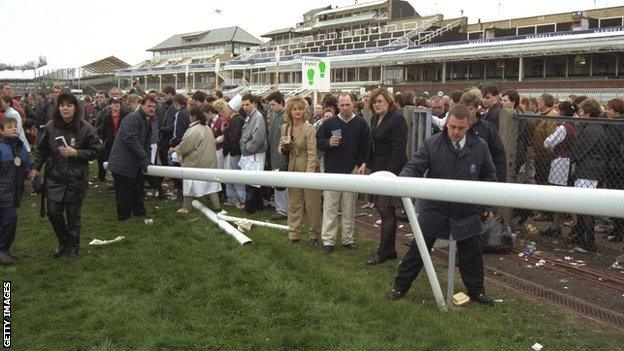
Everyone at Aintree - including the BBC - was instructed to evacuate in 1997
I think most of us thought we'd be back in place quickly, but then came the words, live on BBC TV, from Charles Barnett, the MD, which still ring in my ears today.
"There have been two coded bomb warnings received by the police," he said, "and there's no possibility of taking any chances.
"So, I just ask everybody here, including you the BBC, to leave the course and get out onto the public highway, immediately."
Including you the BBC…
And off we went, in probably the biggest ever peacetime evacuation,, external leaving behind cars and other belongings, a situation that proved particularly testing for jockeys exiting in just their silks, breeches and boots.
I recall one woman hysterical on the Melling Road because she'd 'lost' her husband, but though there were elements of chaos, the main feeling was of shocked resignation, all topped with a fair smattering of the renowned Scouse humour.
As he strolled into the Adelphi Hotel in the blue and white silks of Suny Bay's owners, jockey Jamie Osborne recalled a doorman asking: "Hey, mate, have you come straight from work."
5 live's programme on Thursday hears how the people of Liverpool rallied around the stranded thousands, offering food and drink and beds in accommodation ranging from private houses to makeshift dormitories in hotels, church halls and community centres.
For the horses, stabling was found, though some did stay, but then came the big question as to what everyone else was going to do.
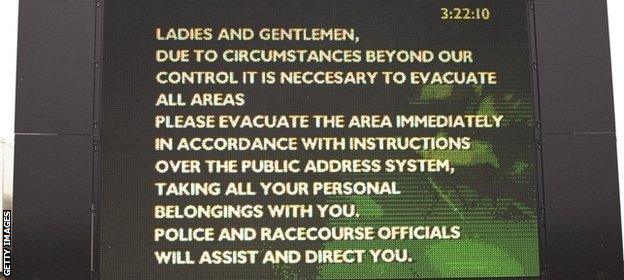
Racecgoers were told to evacuate the area immediately
And the answer is that as Paul Stephenson, Charles Barnett and senior members of the Government, who'd now become involved, worked out whether the Grand National could still take place, others went into Saturday night party mode.
Osborne told 5 live: "You've got 40 guys that are all adrenalin-pumped to go out and ride in a Grand National, and all of a sudden there's no outlet, so yes things did have a tendency to degenerate.
"And then there was the panic the next day when news filtered through that they were going to run the race - so after 24 hours of disregarding our bodies, we had the next 24 to prepare for the race."
Eventually the 150th Grand National took place, without incident, at 17:00 on the Monday, watched by 20,000 people-plus on the course, there for free.
Prime Minister John Major left the election trail to present trophies to those involved with the race going to Lord Gyllene who came home as a 20-length winner under jockey Tony Dobbin; Suny Bay was second.
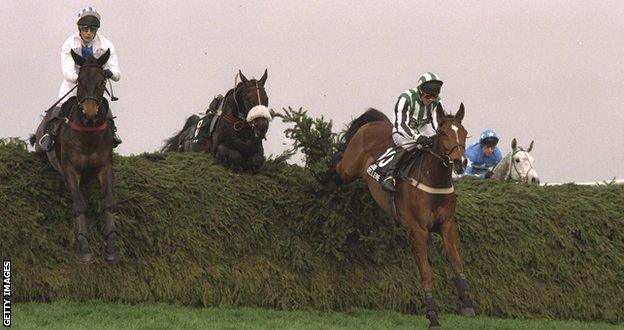
Lord Gyllene, a 14-1 chance, triumphed when the race was eventually staged on the Monday
Police concerns about security - there were further threats - continued during the day, but Stephenson believes the correct decision was made to go ahead.
He said: "I'm proud that we got a 1-0 victory over the terrorists which was hugely important.
"[Had the race been cancelled] this would have been a massive, massive coup for terrorists on an international stage and very bad publicity for UK and Northern Ireland plc."
Fears that such a disruption might become commonplace didn't materialise, although Aintree 1997 continues to be used as a model for security tactics at major sporting events worldwide.
- Published7 April 2017
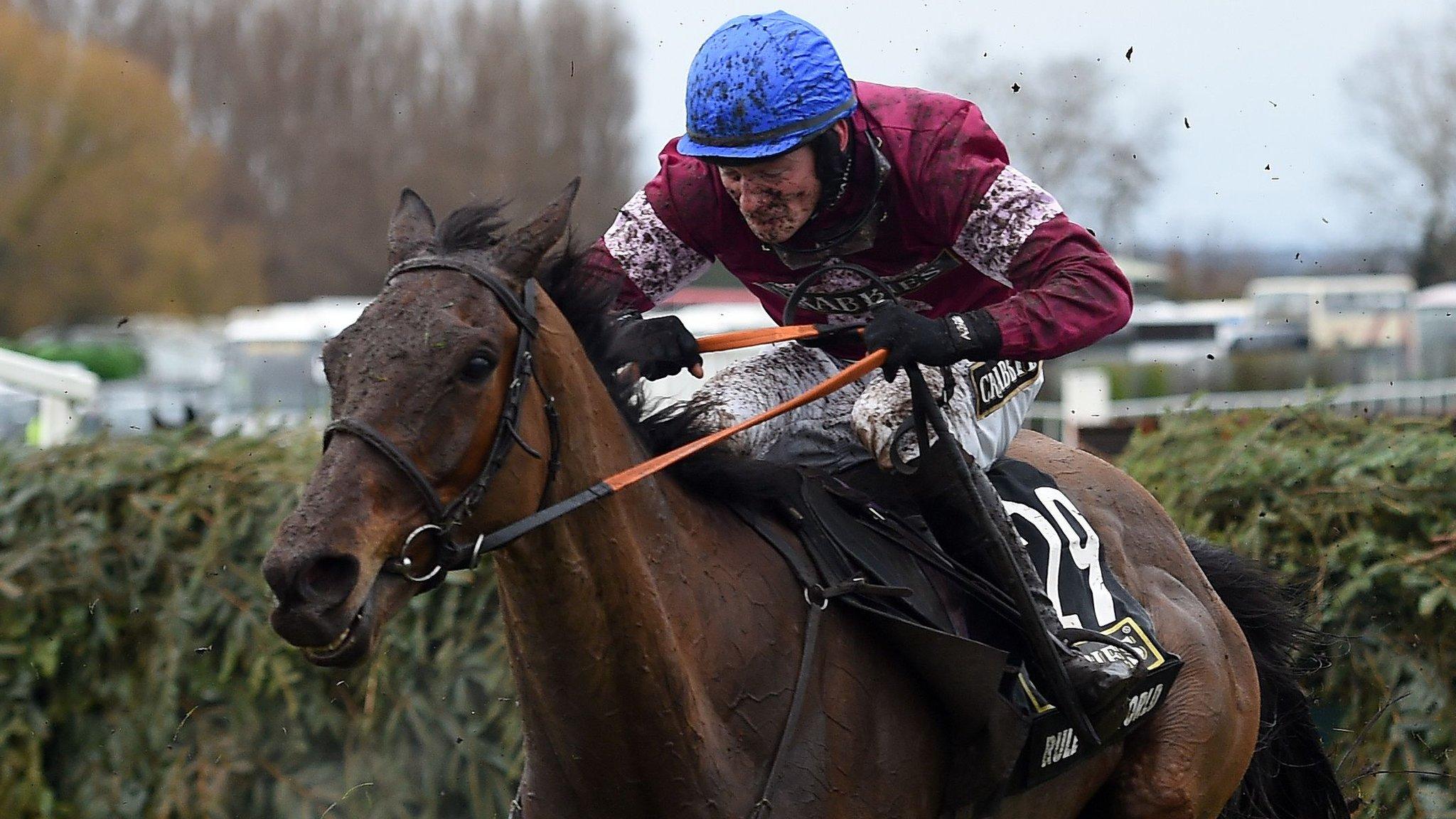
- Published6 April 2017
